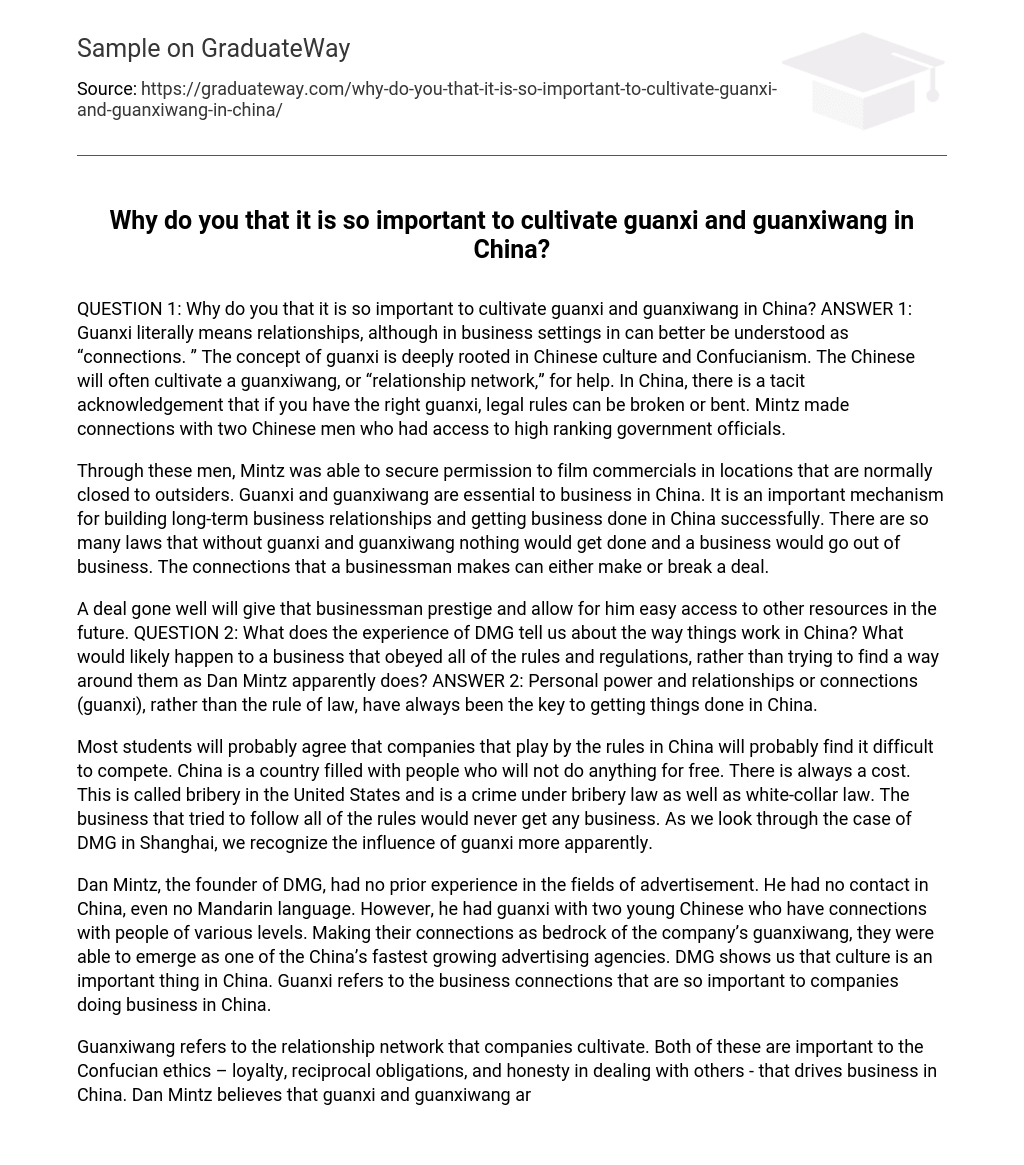QUESTION 1: Why do you that it is so important to cultivate guanxi and guanxiwang in China?
ANSWER 1: Guanxi literally means relationships, although in business settings in can better be understood as “connections. ” The concept of guanxi is deeply rooted in Chinese culture and Confucianism. The Chinese will often cultivate a guanxiwang, or “relationship network,” for help. In China, there is a tacit acknowledgement that if you have the right guanxi, legal rules can be broken or bent. Mintz made connections with two Chinese men who had access to high ranking government officials.
Through these men, Mintz was able to secure permission to film commercials in locations that are normally closed to outsiders. Guanxi and guanxiwang are essential to business in China. It is an important mechanism for building long-term business relationships and getting business done in China successfully. There are so many laws that without guanxi and guanxiwang nothing would get done and a business would go out of business. The connections that a businessman makes can either make or break a deal. A deal gone well will give that businessman prestige and allow for him easy access to other resources in the future.
QUESTION 2: What does the experience of DMG tell us about the way things work in China? What would likely happen to a business that obeyed all of the rules and regulations, rather than trying to find a way around them as Dan Mintz apparently does?
ANSWER 2: Personal power and relationships or connections (guanxi), rather than the rule of law, have always been the key to getting things done in China. Most students will probably agree that companies that play by the rules in China will probably find it difficult to compete. China is a country filled with people who will not do anything for free. There is always a cost. This is called bribery in the United States and is a crime under bribery law as well as white-collar law. The business that tried to follow all of the rules would never get any business. As we look through the case of DMG in Shanghai, we recognize the influence of guanxi more apparently.
Dan Mintz, the founder of DMG, had no prior experience in the fields of advertisement. He had no contact in China, even no Mandarin language. However, he had guanxi with two young Chinese who have connections with people of various levels. Making their connections as bedrock of the company’s guanxiwang, they were able to emerge as one of the China’s fastest growing advertising agencies. DMG shows us that culture is an important thing in China. Guanxi refers to the business connections that are so important to companies doing business in China.
Guanxiwang refers to the relationship network that companies cultivate. Both of these are important to the Confucian ethics – loyalty, reciprocal obligations, and honesty in dealing with others – that drives business in China. Dan Mintz believes that guanxi and guanxiwang are important because they help companies get around restrictions that limit the ability of companies to function. It also is very useful when you have a business that delivers a good job; they.
QUESTION 3: What are the ethical issues that might arise when drawing upon guanxiwang to get things done in China? What does this suggest about the limits of using guanxiwang for a Western business committed to high ethical standards?
ANSWER 3: Guanxiwang refers to the relationship network that many Chinese companies rely on. Because reciprocal obligations are key to the process, some students may suggest that companies could get into trouble if they are asked to return a favor to a network partner that involves unethical actions. Other students may note that in China, it is not what you know that is important, it is who you know. These students may point out that since success depends on others, firms doing business in China are not in…
The ethical issue is also a law in the United States, bribery. The question is should we do business with people who expect favors in turn for a favor? What if that is the only way to do business? These are hard questions. A Western business could never follow through with guanxiwang if they were committed to high ethical standards. They would have to go against their beliefs to work in China.





